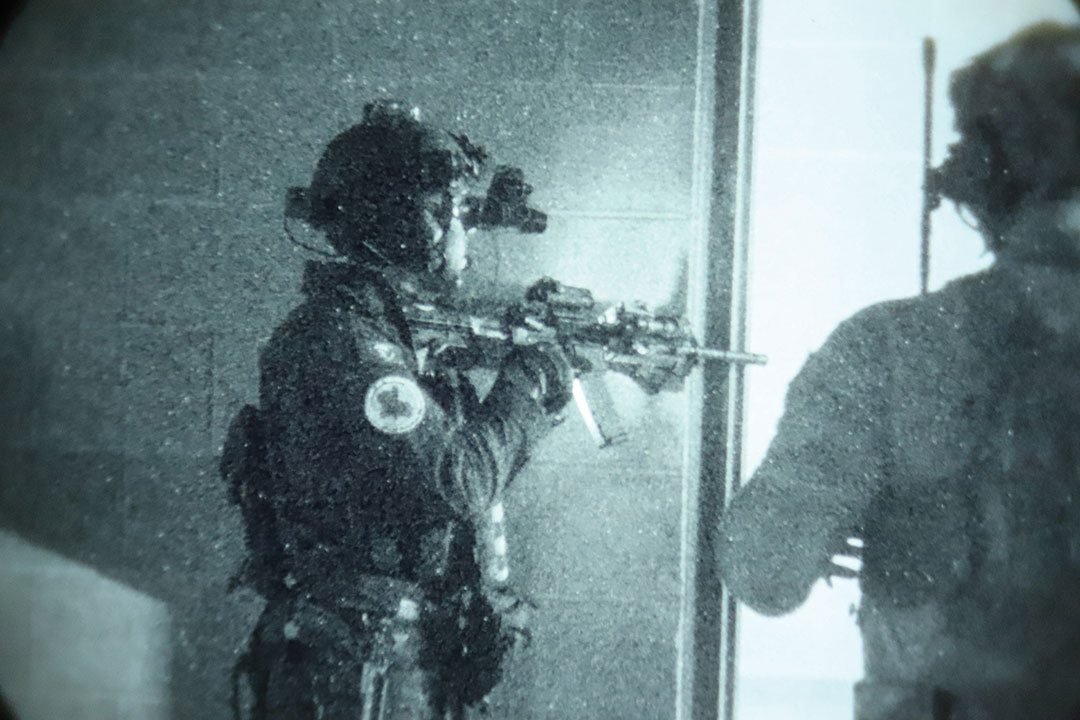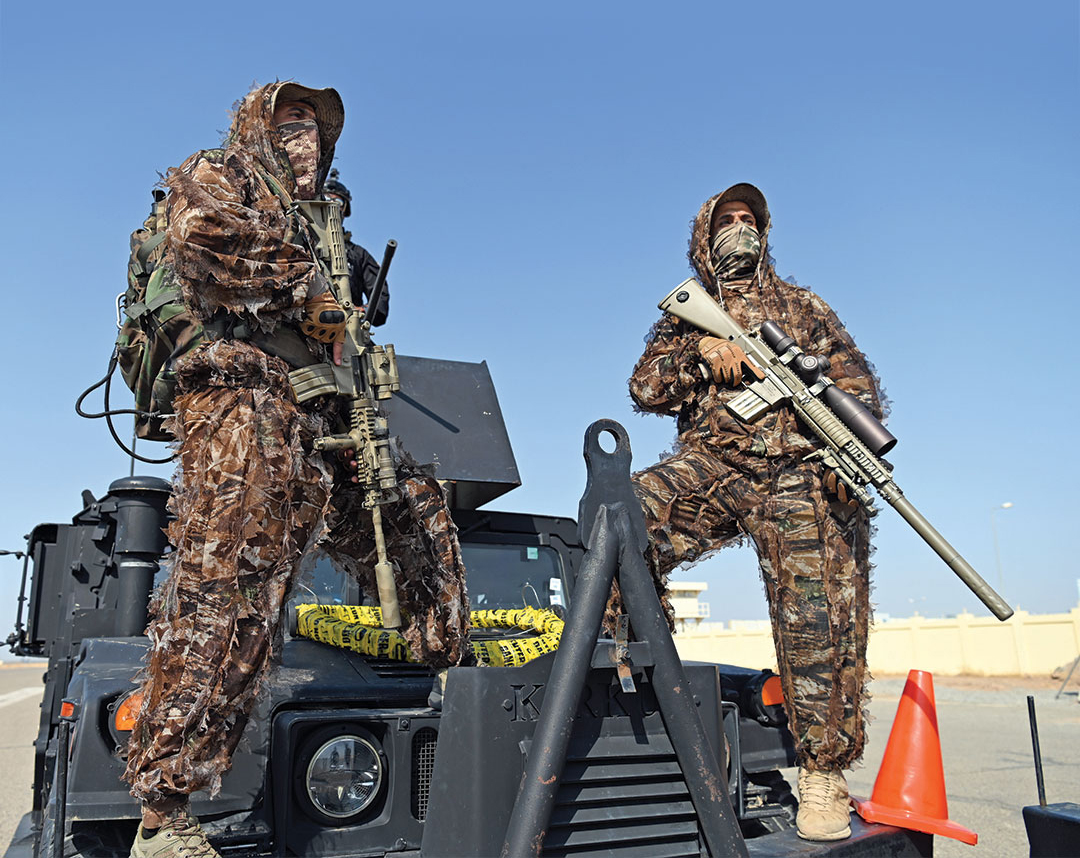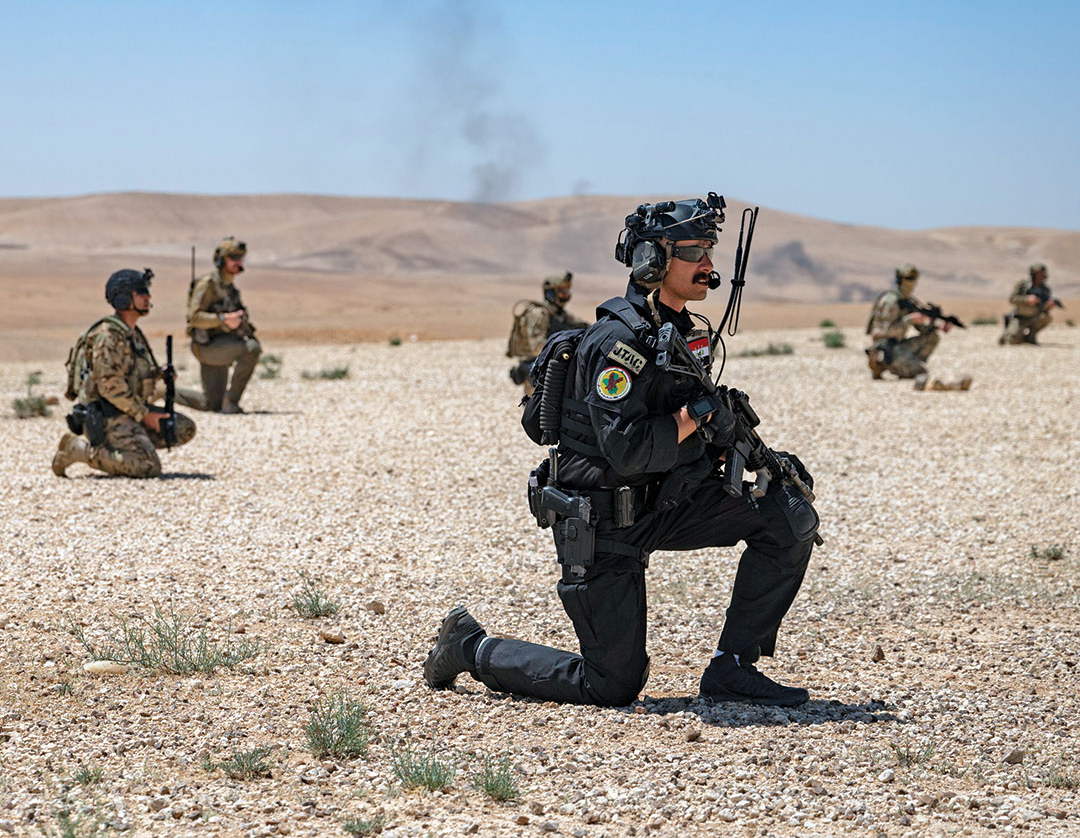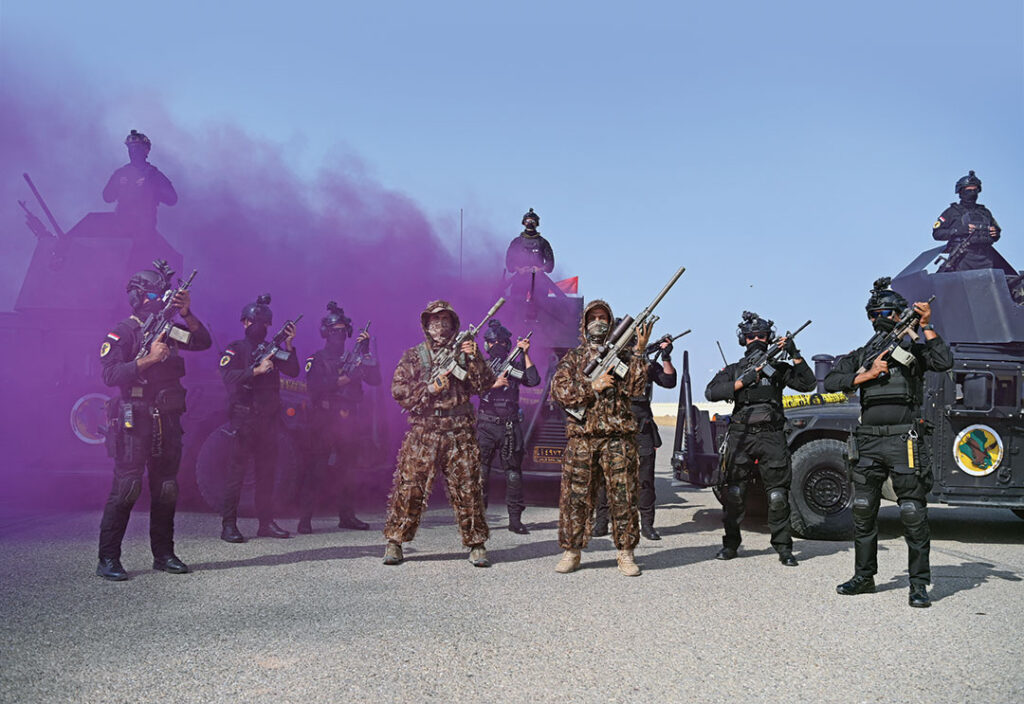 When Iraqi Counter-Terrorism Service officers talk to each other, they use terms not used anywhere else. It is as if these heroes have a language of their own. They know each other by the number of battles they have fought and the injuries they have sustained during these fierce engagements against terrorist gangs, battles that resemble those from ancient sagas.
When Iraqi Counter-Terrorism Service officers talk to each other, they use terms not used anywhere else. It is as if these heroes have a language of their own. They know each other by the number of battles they have fought and the injuries they have sustained during these fierce engagements against terrorist gangs, battles that resemble those from ancient sagas.
Their gatherings encompass the full spectrum of Iraqi society — Kurds, Arabs, Turkmens and Assyrians — united under the Iraqi flag. This is how Brig. Gen. Ali Hashem al-Kenani, deputy commander of the First Special Operations Division of the Counter-Terrorism Service, describes the brave men under his authority.
Brig. Gen. Ali’s biography is full of heroism. In 1999, he joined the Iraqi Military Academy, where, after completing basic infantry training, he sought specialized training in guerrilla and mountain warfare. After 2003, he was selected to join the elite ranks of Iraq’s first Special Operations Forces and received advanced training at the King Abdullah II Special Operations Training Center in Jordan. Courses were supervised by U.S. Special Forces instructors.
“Most armies in the world gain expertise through training and many years of military exercises and moving between different units, but in Iraq we are selected for the battlefield from the first week of training,” the brigadier general told Unipath.

“My first assignment after 2003 was as a platoon commander in the 3rd Infantry Brigade with the rank of first lieutenant in the Mosul-Tal Afar sector in 2004. At the time, Tal Afar district was controlled by al-Qaida and Iraq was immersed in a cycle of violence and sectarian fighting. My platoon and I lived through many difficult days and fought bloody battles against terrorist gangs. Despite the darkness of those days and uncertainty about the future, which looked like a dangerous slide into a sectarian and ethnic war, I was instilling a spirit of patriotism in the Soldiers and reassuring them that Iraq would prevail.”
Brig. Gen. Ali believes that a commander’s real battle lies in upholding military honor, integrity and patriotism because these are the hallmarks of an unbeatable commander.
“A true commander is one who sets an example for his Soldiers by upholding military honor and integrity in the performance of his duty. He may be exposed to many temptations, but he must always remember his oath to God and his country,” Brig. Gen. Ali said.
“A Soldier’s respect for his commander does not come through violence and power, but through the integrity and fairness of the commander toward his Soldiers. A corrupt leader cannot have courage and cannot earn the respect of his Soldiers. This is why successful leaders are men of humility and integrity.”
Brig. Gen. Ali emphasizes the importance of good intelligence in a war against terrorist gangs that hide among civilians. The goal is to protect civilian lives and avoid collateral losses and damage.
“Since the battles of Tal Afar in 2004, I have learned from our coalition counterparts the importance of sharing [and intercepting] intelligence, which is the key to victory. You may be able to storm a village with tanks and crush terrorist hideouts, but you will incur unnecessary losses of troops and put civilian lives at risk,” he said. “Civilian populations are a precious resource that military forces must protect. When the population trusts you, they will provide you with valuable information so that you can prevail with minimal losses.”

His body is adorned with numerous scars from the battles he fought, scars of which he is proud. Every scar is accompanied by its own story and memory. He chose to remain on the battlefield despite his injuries because he believed that his Soldiers needed him there until the battle ended.
“I fought in the battle to liberate Tal Afar in 2004-2005, where we fought door to door and in alleyways littered with booby traps and suicide bombers. Death was always moments away. For terrorists, Tal Afar was the lifeline through which foreign fighters, explosives and ammunition passed through Syria. This is why they fought so hard for it,” Brig Gen. Ali recalls.
“Despite my injury, I refused to evacuate because I was the commander of the platoon and I had to lead it to victory while safeguarding the lives of the Soldiers who drew their determination from me.”
The year 2007 marked an important milestone in Iraq’s modern history, when sectarian warfare was at its peak and corpses littered the streets. That was when the Iraqi government and coalition forces launched a large-scale operation dubbed Operation Imposing Law. Brig. Gen. Ali participated in this operation. It would determine the fate of the new Iraq.
“I believed in Operation Imposing Law as my national duty. On that day, before moving to our sector of responsibility in a suburb of Baghdad, I gathered my men and spoke to them of the importance of this operation during which, above all ethnic and religious affiliations, we must be loyal Soldiers of Iraq because any bias in favor of any sect or faction will have major repercussions,” he said.
“Despite the dangers of the mission, we were able to win the trust of the population and prevented the spread of violence, which we contained in isolated pockets in which terrorists were either arrested or killed. Iraqi citizens provided us with accurate information on the hideouts of militants and criminal gangs, enabling us to establish security in Baghdad within months. This noble mission was the cornerstone of a democratic Iraq that embraces freedom of opinion, multiple religions and tolerance.”

There is no doubt that Daesh’s subjugation of large swaths of Iraqi territory came as a shock to security forces. However, a few elite counterterrorism units held their positions in Camp Ghazlani, Speicher Air Base and the Baiji oil refinery. Brig. Gen. Ali led a heroic and epic fight to hold his defensive position rather than surrender the Baiji refinery to terrorist gangs.
“The battles of Baiji refinery had a strong impact on me because we held out for nine months, surrounded on all sides by booby traps and snipers. What made Baiji special was the ethnic and religious diversity of the fighters, all of whom were united under the Iraqi flag,” Brig. Gen. Ali said.
“Every religion and sect in Iraq has its own cemeteries. However, there is one cemetery in Iraq for all religions and sects. That is the small cemetery where those who died fighting in Baiji are buried, and above whom the Iraqi flag flies high. The feeling of victory after we had lost all hope of surviving was glorious. But it was the resilience of the fighters in the face of the most brutal attacks that made this legendary battle real.”
Brig. Gen. Ali rose through the ranks from platoon commander to his current position, where cumulative experiences come together to shape the capabilities of field commanders.
He started as platoon commander during the battle of Tal Afar, then as deputy company commander for two years before becoming a special forces company commander in Operation Imposing Law. He engaged in the battle of Saulat al-Fursan in 2008 as a deputy commander of a counterterrorism regiment. In 2018, he assumed the position of Director of the Information Exchange Division in the Intelligence Directorate of the Counter-Terrorism Service.
After moving to the Operations Directorate, he rose to Chief of Staff of the First Special Operations Command before becoming Deputy Commander in 2022. He currently is commander of the First Special Operations Command.
Brig. Gen. Ali spoke of the importance of having a strong international ally that respects treaties and agreements.
“I’ve been working with coalition forces since 2003, and I’ve learnt a lot from them, just as they’ve learnt a lot from us. Working in a joint operations environment is important for gaining tactical expertise and learning new ways of doing things,” he said.
“The battles to liberate cities from Daesh have shown us the importance of working alongside international partners to cut off funding and supplies to the terrorist octopus with its sprawling network that spans the globe. The coalition has played a major role in arming and equipping our armed forces and provided continuous air support during the liberation battles. We continue to work together to prevent the return of terrorism.”

